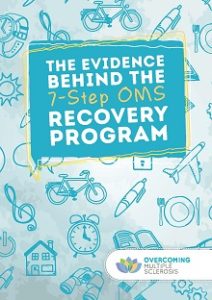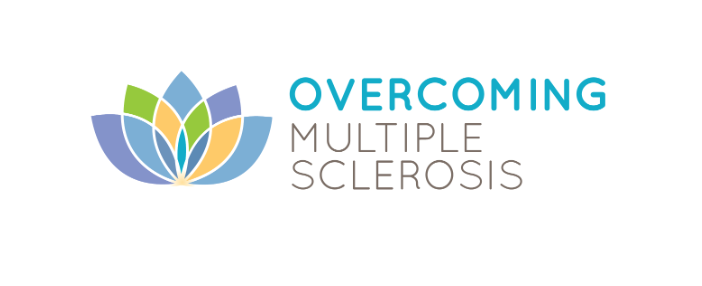A program of diet, supplements and lifestyle changes integrated with conventional medicine to help people with Multiple Sclerosis (MS) live longer, better and healthier lives
“Healing Tools” summaries are a collection of evidence-based resources to help providers and patients use integrative health approaches to improve health and wellbeing.
This tool is for:
- Patients and their family members
This tool was created by:
- Overcoming Multiple Sclerosis (OMS)
SUMMARY
What is this tool for?
About 75% of how you do after being diagnosed with MS is influenced by your environment and lifestyle.[i] Diet and lifestyle changes, along with conventional medicine, can:
- Reduce the chance of MS relapses and slow progression of the disease
- Help those with MS improve their hope, function, symptoms and wellbeing
These changes work best in people who are newly diagnosed with MS.
The Overcoming Multiple Sclerosis 7-Step Recovery Program (OMS 7-Step Recovery Program) integrates diet and lifestyle changes with conventional medicine to help people with MS live longer, better and healthier lives. Professor George Jelinek developed the program in 2001, after he was diagnosed with MS.
Program Parts
The program is based on:
- Diet and omega-3 supplementation
- Exercise
- Stress management
- Vitamin D and sunlight
- When needed, medication
Diet and Omega-3 Supplements
- A plant-based, whole-food diet, plus seafood
- No meat and no dairy
- No or very little saturated fat
- Omega-3 fatty acid supplements:
- 20-40 mL of flaxseed oil daily
- Optional B group vitamins or B12 supplement, if needed
Exercise
20-30 minutes of exercise 3-5 times a week, preferably outdoors
Stress Management
30 minutes a day of meditation
Sunlight and Vitamin D
- 15 minutes of sunlight 3-5 times a week
- Vitamin D3 supplements:
- 5,000-10,000 IU daily
- Try to keep the blood level of vitamin D high: 150-225 nmol/L
When Needed, Medication
Talk to your doctor to see if you need a disease-modifying drug, and if so, which one is right for you. Compare the benefits of the drug to the side effects.
Other drugs for MS include:
- Steroids for a distressing acute relapse
- Stronger medications for rapidly worsening MS
Free Information and Tools
The Overcoming MS website also offers free:
- In-depth information on each part of the program
- Tools to help you follow the program, including:
- What to Eat/Not to Eat
- Recipes
- Exercise videos for all levels:
- Easy
- Moderate
- Challenging
- Guided audio meditations
- A community forum where patients can share their experiences and get support
- Access to local support groups for people following the OMS 7-Step Recovery Program
- News and research about MS
- General information about MS
- Blogs, podcasts and news on activities for Overcoming MS
Resources from Overcoming MS:
 Overcoming MS: 7 Steps in a blink and more (infographic)
Overcoming MS: 7 Steps in a blink and more (infographic) - Your First (of 7) Steps to Overcoming MS (brochure)
- The Evidence Behind the 7-Step OMS Recovery Program
How does this contribute to an integrative approach?
Combining conventional medicine, self-care, and complementary and alternative medicine can help patients achieve optimal health and wellbeing. The OMS 7-Step Recovery Program combines all of these in an integrative approach that helps people with MS live longer, better and healthier lives.
What does the evidence say about this tool?
Professor Jelinek developed the OMS 7-Step Recovery Program from information drawn from over 1,000 research articles in top medical journals. This evidence shows that the diet and lifestyle changes in the program along with conventional medicine work in managing MS and improving health outcomes and quality of life.
These diet and lifestyle changes can help:
- Reduce disease activity (relapses and symptoms) and disease worsening in people with MS
- Help those with MS improve their hope, function, symptoms and wellbeing
There are no risks to using these diet and lifestyle changes along with conventional medicine if used properly.
Key Studies
Professor Jelinek and his research team at Overcoming MS have also done studies on the diet and lifestyle changes in the OMS 7-Step Recovery Program. Two key studies were published in top medical journals:
STOP MS
Study participants:
More than 400 people with MS followed the program and approximately 275 filled out documentation forms
Results:
People who improved their lifestyle habits and used their disease-modifying medications improved their quality of life:
- 12-19% after 1 year[ii] in the 73% who filled out the forms at this time period
- 18-23% after 5 years[iii] in the 58% who filled out the forms at this time period
HOLISM (Health Outcomes and Lifestyle)[iv]
Study participants:
More than 2,500 people with MS from all over the world
Results:
People with lifestyles similar to the OMS 7-Step Recovery Program were healthier than those with other lifestyles. They had:
- Less disability
- Fewer relapses
- Better quality of life
- Less depression and fatigue
People who took their disease-modifying medications also had less disability and fewer relapses than those who didn’t take their medications.
More Evidence
Professor Jelinek and his research team at the Neuroepidemiology Unit at the University of Melbourne continue to study MS and to refine the OMS 7-Step Recovery Program. Their research is building more and better evidence for an integrative medicine approach to managing MS.
Who created this tool?
Dr. Jelinek developed the OMS 7-Step Recovery Program. He is head of the Neuroepidemiology Unit at the Melbourne School of Population and Global Health at the University of Melbourne (Australia).
Researchers in the Neuroepidemiology Unit study the modifiable lifestyle risk factors that predict the progression of MS. Their goal is to refine an integrative medicine approach to managing MS.
Overcoming MS is a global non-profit organization and a registered charity in the United States, United Kingdom, and Australia. As an independent, unbiased organization, Overcoming MS does not accept funding or in-kind support from pharmaceutical or other companies that could pose a conflict of interest.
Sources:
[i] Based on many studies published in journals such as Lancet, Nature, and Journal of the American Medical Association Neurology as cited in OMS Evidence brochure [Link to evidence brochure]
[ii] Pui-Ming L, Jelinek GA, Weiland TJ, et al. “Effect of a residential retreat promoting lifestyle modifications on health-related quality of life in people with multiple sclerosis,” Qual Primary Care. 2010; 8:379-89.
[iii] Haggis EJ, Jelinek GA, Weiland TJ, et al. “Health-related quality of life outcomes at 1 and 5 years after a residential retreat promoting lifestyle modification for people with multiple sclerosis,” Neurological Sciences. 2013; 34:187-95.
[iv] Based on many studies published in journals such as Journal of Neuroscience, BMC Neurology, Nutritional Neuroscience, and PLOS ONE. See https://overcomingms.org/neu-holism-study/
ABOUT THESE INTEGRATIVE HEALTH TOOLS
At Healing Works Foundation, we believe that achieving optimal health and wellbeing requires an integrative health approach—one that combines and coordinates conventional medicine, self-care, and complementary and alternative medicine.
Translating Evidence into Action
The goal of these summaries is to help providers and patients learn about and access evidence-based integrative health tools.
Disclosures:
Healing Works Foundation is a nonprofit organization and does not profit from any of the tools featured in these summaries.
Patients: Contact your provider before starting any new health program. Show him/her these resources.

